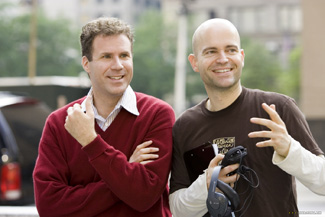Director Spotlight: Mark Forster
By Joshua Pasch
February 2, 2011
Kite Runner
I read Khaled Hosseini’s novel, The Kite Runner, as a senior in high school. It was at that point in my high school career that I became articulate enough, and perhaps bookish enough, to lob some serious criticism at the author and at my International Relations teacher for passing it off as part of curriculum. There was too much shmaltz, too much “Hollywood” to really tell the war-torn story of Kabul, Afghani-refugees, Russian invasion, and the rise of the Taliban. I liken it to Hollywood’s retelling of Pearl Harbor as a love story – I thought Hosseini glossed over the important points.
Five or six years have passed since then, and I’ll admit I know far less about the world today. I am less politically active, aware, or concerned, and I’m not proud to announce it. When I queued up Kite Runner on Netflix instant watch, I was ready to dislike it. And I’ll start by saying that the film isn’t great. It suffers from an excess in content/scope for a two hour film; also Forster’s set pieces never achieve a feeling of authenticity. Maybe part of that was budgetary, but it still removed me from the experience somewhat. The other criticism that remains is that the story unravels like a soap opera – the kind with a third act reveal that involves illegitimate children and hidden romances. I can’t directly spoil it here but suffice it to say that it would sound ridiculous if I did.
Where I once thought the soap operatic story and the shmaltz did the book under, I do think the movie survives in spite of those things. The movie does highlight a culture to which many Americans (and I know I’m generalizing here) have developed a dislike or at the very least an indifference. The Kite Runner has themes of generational respect, friendship, and simple moral good vs. evil that may be simplified, may be Hollywood-ified, but at least they’re being told in the context of a setting and from the perspective of people who are rarely, if ever, highlighted on film. There is a dearth of movies that feature Arab characters. When was the last movie you can recall where the Arab wasn’t a villain (Taken, for example) or the cab driver (any NYC-set rom-com). The Kite Runner has its share of broad villainy – in it, the Taliban are a fairly one-note group of hard-nosed, bearded, AK-47 toting pedophiles. That said, there are also topics about multi-generational barriers, political complexities, and race relations on display here. That’s a lot for any film to tackle – and Marc Forster (who is not Afghani as far as I know) – acquits himself pretty well through it all.
Quantum of Solace
To understand my take on Quantum of Solace, you first have to understand my take on Casino Royale.
Casino Royale was a film that didn’t work for me the first time around. It was bloated and didn’t know how to end. It was a film of “buts.” Craig was an okay Bond, but…why so serious? Eva Green was great, but…not enough skin! The opening chase sequence was cool, but…who was the Bourne-like guy Bond was chasing through Africa? I had a laundry list of quibbles. Alas, maybe I had fallen victim to high expectations. With its through-the-roof tomato-score, I couldn’t wait to see Casino Royale, so I did what I never do (seriously I never do this), and I went alone (it’s so lonely!) to see the film. Boy, was that a mistake. Everyone said I was crazy not to love it. I must have been missing something. I must have been in a bad mood because I was eating a large bucket of too-salted popcorn without a date. I must have been hung up on Sean Connery. How could I not love it!?
Continued:
1
2
3
4
|
|
|
|




